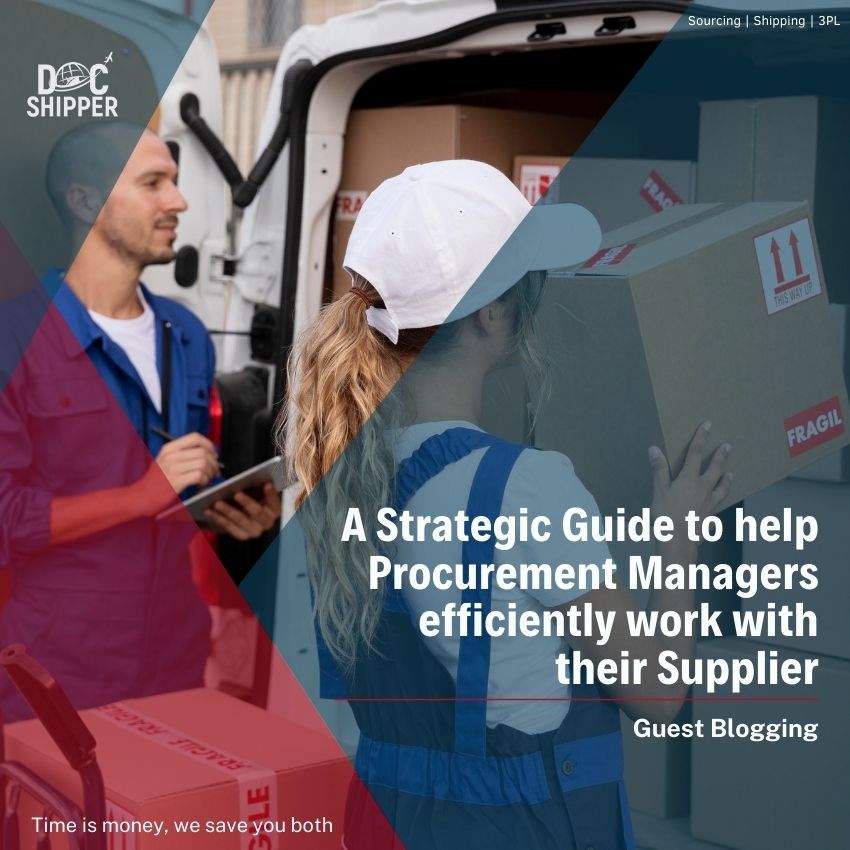Table of Contents
Supplier relationship management (SRM) is the process of dealing with and managing third-party suppliers who supply your company with raw materials, goods, and services. To optimize the value of the business relationship, you pick suppliers that are both cost-effective and operate in strategic locations.
Although simple it may sound, it's far more intricate than that. Because of technological advancements and the global scope of the economy, supplier management has seen a significant transformation in recent years. As a result, finding the best supplier from many options is challenging, but applying innovative ideas to optimize your supplier management system can help.

The main benefit of having a good supplier relationship management is getting more value for your company. The better you know your suppliers, and they know you, the more likely you will receive personalized service, discounted prices, and options that may help you gain leverage in the industry. As a result of this, your supply chain will become more efficient by delivering the right material at the right time and right price.
With effective supplier relationship management, you can consolidate your supply chain, thus focusing on a less complex and smaller group of trusted suppliers that can offer discounted prices.
In addition to this, investing in long-term relationships with suppliers saves you costs of finding and maintaining relationships with new suppliers. Maintaining a good relationship with suppliers also entertains swift requests such as delivering within tight timelines and reduces delays and quality issues.
In a rundown, working with dependable, high-quality suppliers might assist a company in scaling up by providing them with a unique selling proposition (USP). But, on the other hand, unreliable suppliers can cause delays in your workflow and have a negative impact on the productivity of your company.
This guide will discuss how procurement managers can maintain a lucrative relationship with suppliers, manage and measure supplier performance, and work with them efficiently.
7 Strategies To Build A Successful Supplier Relationship
Supplier relationship management is an essential and long-lasting strategy for businesses that can help them stay on the top. Here are seven strategies that can help you manage and interact with your suppliers successfully:
Think Beyond Cost Savings
In procurement, cost savings are not an accurate indication of value creation. It's not just about getting the best deal; it's also about finding the provider who will have your back and assist you with any problem you may be facing.
In addition, you should be able to effectively manage risks associated with suppliers by choosing those that can deliver on time, meet compliance, and meet quality standards.
At the moment, the approach we identify and assess value creation in procurement is too restricted. Procurement will never be considered a strategic role as long as it is viewed just as a cost-cutting activity.
Coming sections will help you to think beyond cost savings and enable you to benefit from a good supplier relationship.
Your Suppliers Are Your Partners
First, consider your suppliers as your partner, not just vendors supplying goods or services to your business. Instead of thinking of them as just sellers, think of them as companions who are helping your business flourish in return for you providing them business.
Know everything about your suppliers. Face-to-face meetings are a great way to learn more about your suppliers' businesses. Understand how your supplier operates, as it can help you see how your company can operate using their best practices. If they have any competitive edge in their model, it will become your advantage as well.
Make them feel they are a part of your business. Inform them of your activities, such as new product launches and promotions. Sending them an invitation to company events helps in creating a personalized relationship with them. Thus, making them feel like a true partner.
Pay attention to their concerns: If they foresee any challenges or risks in the supply chain or have any other issues that might affect the delivery of your products, you need to listen.
If you find an opportunity that might benefit them or provide them extra business, be sure to let them know. If they stumble upon any event that might help your business, they will do the same.
Above all, don't forget to make their life easier by sending out purchase orders with a built in purchase orders software on time, being explicit about deadlines, and communicating your expectations.
Active Collaboration
Focusing just on the price of the acquired goods and services restricts the hidden value you can gain by actively collaborating with the suppliers. Companies with effective procurement strategies recognize that when buyers and sellers are ready and able to work together, they can frequently uncover significant new sources of value that can benefit both parties. For example, they can adopt a holistic approach to supply-chain optimization, revamping their operations together to eliminate waste and duplication of effort, or procuring raw materials collectively.
In today’s world, Innovation is the key to success. But due to significant R&D costs, innovating your processes might become tricky as it starts capturing your growth in revenue. One way to save R&D costs is to opt for co-innovation with your reliable partners that can help you pursue value driven growth.
Through co-innovation you can collaborate with your suppliers by gathering ideas and reducing development cost and time through their input and in return you can share the findings and optimized internal processes that can benefit them as well.
Collaborative supplier innovation, if managed properly, can result in profitable growth through greater differentiation, efficiency, and reduced costs.
According to a McKinsey analysis of more than 100 significant firms across several industries, companies that consistently collaborated with suppliers had better growth, lower operational expenses, and greater profitability than their industry rivals (Exhibit 1)
Alternatively, they can work together to improve service levels, mitigate risks, and strengthen the integrated supply chain by collaborating on forecasting, planning, and capacity management.
Real-time collaboration allows stakeholders to share information and assure timely delivery instantly. It also allows supply chain partners to participate in 'what-if' scenario planning and troubleshoot demand and supply difficulties.
Stakeholders may use what-if planning to model forecast changes in real-time and plan for various demand scenarios. Collaboration also improves exception management by sending out real-time notifications regarding forecast modifications or mismatches.

Create A Win-Win When Negotiating
Begin negotiating with your supplier with a clear mindset: They are not your opponent. Remember, they are your partners. Try to find the middle ground by determining clear objectives for your company. Clear communication and active listening will help all parties recognize their objectives while allowing for a productive discussion on how best to achieve their common goals for mutual benefit.
Instead of demanding your wishes, communicate your interests. This will help in agreeing on terms that might benefit both parties. For example, your company's interest is to reduce its organizational spending of Product X by 3% for the coming year. In contrast, your supplier's interest might lie in increasing 5% of your last organizational spend.
Since they also value your company's business, they will try to explore all the potential possibilities where both party's interests can meet. Therefore, instead of settling for the first outcome, principled negotiation encourages participants to use their negotiation abilities to develop various options that both parties find acceptable.
For example, the interests of both parties might have a conflict. By brainstorming different ideas, your supplier can decrease the price of a particular product if you agree to purchase that product from the supplier in the long term or procure other products from them.
Negotiation is a risky business, and things don't always go as planned. Therefore, it would be best always to have a backup plan that allows you to accomplish as much of your original goal as feasible while still maintaining the win-win situation. Without the rigidity of a "bottom line" demand, having a backup plan allows you to enter and conduct talks with clarity.
So, although your initial goal in negotiating with the supplier was to cut as much of your Product X spend as feasible, they aimed to raise your total spend with them; by having alternatives, you can bring other options on the table that altogether satisfies both parties. For example, reducing your organizational spend by 2% by giving the business of Product Y and Product Z to the same supplier.
On-time Payments
According to research, 60% of UK firms have been charged late payment costs. So said, paying on time saves you money. Not just that, but establishing a track record of paying on time every time may provide you power in negotiations about timely payment reductions or more favorable conditions.
Make sure you pay them on time so that you do not lose your suppliers. You need to demonstrate that you are a dependable customer and that you are simple to work with.
By delaying payments, you are damaging the supplier relationship, as your supplier will look for another customer that pays on time. If you remain consistent and pay late, then your supplier might cut ties with your business as well.
Late payments result in heavy penalties that means you are paying more than you should. It limits your capacity to negotiate in future deals and also deteriorates the image of your company throughout the industry, making it hard to find new suppliers.
If you cannot make a payment on the agreed-upon date, notify the provider as soon as possible and let them know when they may anticipate payment. Suppliers value timely payment as you value rapid action from them.

On occasions, your company may make mistakes or run into difficulties on your projects. An adequately treated supplier who gets paid on time is more responsive and helpful.
You will then have to rely on your suppliers for assistance. They will try to deliver on shorter deadlines and cater to special requests because they enjoyed working with you previously.
Similarly, when you as a procurement manager run out of materials, suppliers will be more willing to work with you and expedite the missing products to your workstation.
Suppose the project slips behind schedule and you need your subcontractors to assist you by working on weekends. In that case, they will try to accommodate you as they value the timely payments and the excellent relationship that has been established.
You will have your justifications for your payment conditions, but keep in mind that your supplier will have his own objectives. So be honest about your reasons, understand theirs, and talk to reach an agreement.
In the bigger picture, if companies fail to pay up their suppliers on time, it might disturb sellers' cash flows. Some companies have policies of releasing the payments after 90 days or so on. Imagine managing payroll, operating expenses, and other costs with tight cash flow.
This might also lead suppliers to go bankrupt and shut down their businesses eventually. Fewer suppliers mean less negotiating power and fewer options available to the buyers, hence decreasing overall profitability.
Interested in our services? Need personalized information?
Our experts will answer you within 24 hours
Set KPIs To Measure And Feedback To Supplier On Regular Basis
KPIs stands for Key Performance Indicators. It is a quantifiable measure of performance over time for a specific objective. For example, you might gauge the performance of your procurement team against the goal of cutting down 10% of the procurement expense in three years. KPIs are the key targets that need to be met.
To set KPIs for suppliers, you need to understand the needs and goals of your business. Each sector and organization have unique needs; thus, procurement managers should choose KPIs that emphasize those objectives. For example, retail organizations place a high value on timely delivery, but utility companies such as energy providers place a high value on safety.
Some ways to measure your supplier performance can be by their:
- Timeliness: The time taken to deliver the products. This includes meeting order deadlines.
- Completeness: Delivering the complete orders with no missing products within the deadline
- Quality: Low defect rate in a batch. Also includes meeting quality standards.
- Productivity: Process Efficiency of the supplier
- Regulatory Compliance: Working within the confines of legal requirements, health and safety measures, or organizational rules
- Social responsibility: Initiatives promoting sustainability, diversity, or community involvement
- Innovation: Continually improving processes to receive better output
The demands of the company impact each measuring area. These criteria may represent the demands of the stakeholder, end-user, or meet unique project requirements. Furthermore, the measuring area should satisfy the organization's needs. For example, there may be a company-wide necessity to increase working capital or corporate and social responsibility performance.
Supplement performance measures should be few as dealing with a more significant number of KPIs will lead to wasted resources. Moreover, these performance indicators should be created in a way that motivates your suppliers to meet them.
Once you have decided which KPIs you will be focusing on, manage them through SMART goals. It stands for Specific, Measurable, Attainable, Relevant, and Time-bound. So, for example, if your business needs to focus on Quality, your KPIs should be something like, "10% decrease in warranty claims by the consumers in next 12 years".
Digital Transformation
According to Levvel Research, 85 percent of POs (Purchase Orders) are now issued online or by email. As digitization becomes more prevalent, it is necessary to guarantee that your supplier connections are adequately handled. From the initial request through activation, technologies enable companies to create and maintain a strong supplier base.

Top-notch firms are now adopting an automated supplier self-management process during which new suppliers can log in and submit their company information, generate payments within deadlines by making the approval process more efficient by sending out reminders, and so on.
By digitally enabling your supplier management process, you can use online forms to collect supplier data directly from the supplier to validate the supplier's request internally.
Procurement automation software matches the supplier’s provided information against the pre-set criteria defined by the companies which ensures internal validations and necessary compliance is met, thus verifying that the onboarded supplier meets your company's regulations.
This helps in effectively storing and managing the supplier information, enabling the procurement and accounts payable teams to evaluate information and communicate with the supplier more promptly.
Suppliers can use automation enabled functionalities such as 'PO-Invoice Flip' to take the required information from a PO and automatically generate an invoice with it using an invoice management system. For example, product information, quantity, and business information may be used to generate a compliant invoice, which can then go through the matching and approval procedure.
Once the invoice is matched against Goods Receivable Note (GRN) and Purchase Order (PO), it is sent for approval. Procurement automation provides a comprehensive invoice approval software which ensures the validity of the payment.
With the efficiency of approval and verification process provided by procurement automation software, payments are released timely and hence helping in maintaining a good relationship with suppliers.
This procedure also dramatically reduces the amount of internal AP labor required, boosts first-time match rates, and provides the supplier with trust and insight into the settlement of their invoices.
Conclusion
Creating a solid relationship with your suppliers is just as essential as maintaining good relations with your customers. It is not difficult to develop a genuine relationship with your supplier; follow these guidelines and watch your business thrive. With different technologies available, you can easily streamline your transactions with your suppliers and maintain a beneficial, long-lasting relationship with them. A healthy supplier relationship is well worth the effort, since suppliers are genuinely the untapped sources of development.
Contribute with your content to inspire thousands of logistics readers through our blog.
Publishing posts is a daily mission for us
Why do you need to manage your relationship with suppliers?
There are several advantages of keeping a healthy relationship with suppliers. It helps in detecting and addressing supply chain problems before they arise. It decreases the chances of fraud and other costly mistakes through open communication and collaboration It aids in consolidating your supply chain, hence decreasing the number of suppliers and streamlining the process It leads to negotiation at comparatively lower prices for new products It makes them reliable when you have to deliver under tight schedules
How to manage and measure supplier performance?
You can measure supplier performance against some or all of these measures: Timeliness, Completeness, Quality, Productivity, Compliance, Sustainability/Social Responsibility, and Innovation. Choosing which dimensions to measure supplier performance may depend upon the overall goals of your company. You can develop SMART (specific, measurable, attainable, reachable, and time-bound) KPIs to effectively measure their performance. Remember, these KPIs should be able to motivate them to meet the targets. You can review their performance quarterly, yearly, or as needed.
How to create a win-win strategy while negotiating?
While negotiating, avoid considering your supplier as the opposition party. They are your partners. Focus on interests rather than personal positions. Acknowledge and understand their perspective. Find common ground where you and your supplier's interests are met. Create new options through active communication and collaboration that can benefit both parties. Always have a fallback plan or alternative options if things don't work out.
Why are on-time payments important to maintaining a long-lasting supplier relationship?
Late payments are undesirable for any company. Not getting timely payments can disturb the supplier's cash flow and leave them financially vulnerable. In addition, paying late diminishes trust and, as a result, reduces the possibility of developing long-term relationships. It is also in your best interests to assist your suppliers in maintaining a constant flow of money. If you do not pay on time, they may be unable to refill supplies from their own vendor management system. Moreover, your supplier will not accommodate or help you out if an unexpected demand arises and won't prefer taking your business next time.
What are the benefits of digitally transforming your supplier relationship?
Automated Supplier Relationship Management establishes a centralized platform in which suppliers may engage with your company effectively while easily accessing the necessary information about tenders, RFQs, and flipping POs into invoices. The technology enables organizations to maintain and view meetings, surveys, and invoices all in one place, allowing suppliers to collaborate with your company efficiently. Suppliers that provide the most incredible value to the business will be clearly shown, making it easier to determine which partnerships deserve the most attention.
Author Bio
Mohammed Kafil is a certified procurement consultant who has been coaching companies to establish resilient digital procurement operating models for over a decade now. With Kissflow Procurement Cloud, a flexible procurement software that streamlines the end-to-end procure-to-pay process, and also eventually the vendor management process. Kafil helps medium and large enterprises with their digital transformation projects. In the recent past, he has also worked with Fortune 500 companies to implement platforms like Coupa, Ariba, Ivalua, and BuyerQuest.
DocShipper info: Do you like our article today? For your business interest, you may like the following useful articles :
- Coronavirus (Covid-19) impacts on import/export business
- How does Coronavirus impact international supply chain?
- 💡How to find a good product to sell?
- How to find your reliable supplier for your business? [Fair Trade Guide]
- AliExpress | Use the Chinese panacea to sell your products online
- How a sourcing strategy can rocket your margin?
DocShipper Advise : We help you with the entire sourcing process so don't hesitate to contact us if you have any questions!
- Having trouble finding the appropriate product? Enjoy our sourcing services, we directly find the right suppliers for you!
- You don't trust your supplier? Ask our experts to do quality control to guarantee the condition of your goods!
- Do you need help with the logistics? Our international freight department supports you with door to door services!
- You don't want to handle distribution? Our 3PL department will handle the storage, order fulfillment, and last-mile delivery!
DocShipper | Procurement - Quality control - Logistics
Alibaba, Dhgate, made-in-china... Many know of websites to get supplies in Asia, but how many have come across a scam ?! It is very risky to pay an Asian supplier halfway around the world based only on promises! DocShipper offers you complete procurement services integrating logistics needs: purchasing, quality control, customization, licensing, transport...
Communication is important, which is why we strive to discuss in the most suitable way for you!







